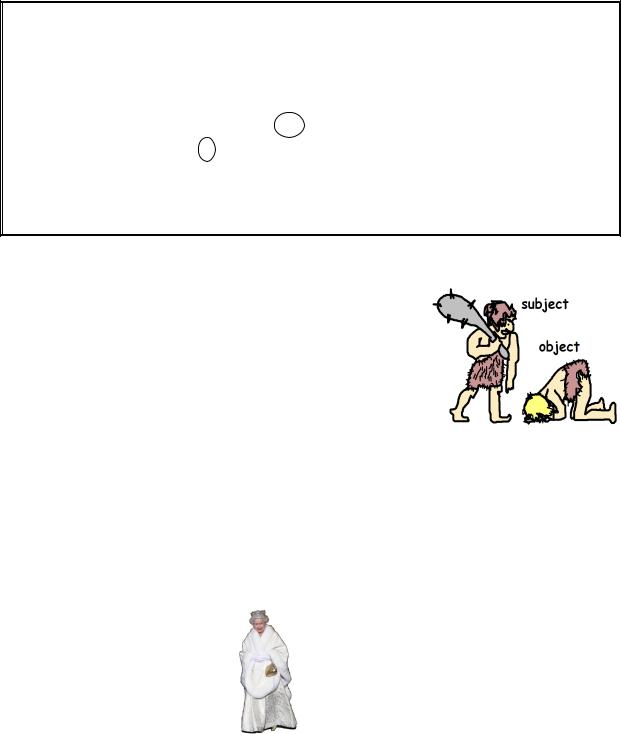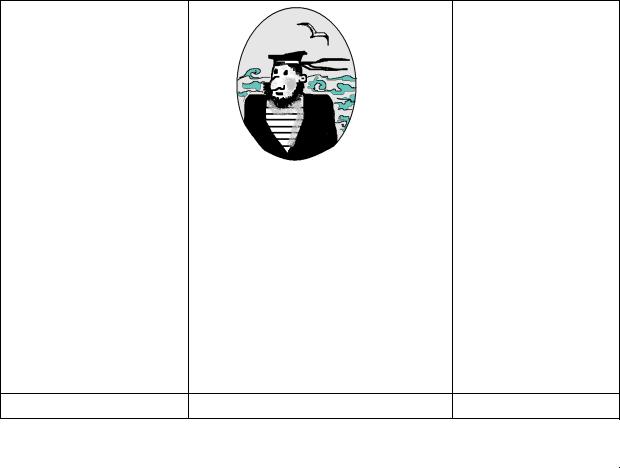
Unit 1
.pdf
3
UNIT 1 |
PASSIVE |
That huge fat turnip can hardly be pulled out; it is too passive!
In a typical English sentence there is a subject and a predicate. They (subject) met (predicate).
He (subject) gave (predicate) her flowers. She (subject) kissed (predicate) him.
The action expressed by the verb can be directed at some object.
He met me at the station.
(object of the action) (object of the sentence)
1.Spot and underline the object of the action which is also the object of the sentence.
1.My dog bit a neighbour a year ago. 2. I’ve never grown turnips,
you know. 3. Has the teacher marked the tests yet? 4. Why don’t they sell fish here? 5. Who arranged the furniture this way? 6. I often lost my things in my childhood. 7. I really don’t know anything about crime. 8. Teenagers seldom obey grown-ups, if at all. 9. How much do you spend on make-up? 10. Who can explain the rule properly?
The object of the action can become the subject of the sentence.
They met me at the station.
I was met at the station.
Меня встретили на вокзале.

4
The form of the verb is different in such sentences.
It’s called PASSIVE.
object of the action
They met me at the station. I was met at the station.
object of the action (Не важно, кто это сделал,
важно, что сделано)
2. Decide in each sentence whether the subject of the sentence is the doer or the object of the action.
1. We bought a new car last week. 2. When was that house sold? 3. Children spend a lot of time playing computer games. 4. The computer was installed last week. 5. He said he’d arrange everything in time. 6. Has everything been arranged? 7. Jane is learning Spanish. 8. She
pulled on her dressing-gown and crept down the stairs. 9. America was discovered ages ago. 10. Mrs. Crane teaches juniors at the local school. 11. Did the Queen really rule the country then? 12. Have you found the files that were lost yesterday? 13. Why didn’t you order a salad?
14.You’ll be informed by June. 15. When is the shop normally opened?
3.Think of suitable subjects for these sentences. Mind the concord.
1. … are made from flour. |
*11. … was written by Gogol. |
||
2. |
… is made from milk. |
*12. |
… was written by Shakespeare. |
3. |
… is made from wood. |
*13. … were painted by Shishkin. |
|
4. |
… are made of wood. |
*14. … was designed by Ch.Wren. |
|
5. … is ruled by Elizabeth II. |
*15. … was initiated by Germany. |
||
6. … are respected by most people. |
*16. … was saved by geese. |
||
7. … are mostly forgiven. |
*17. … was founded many years ago. |
||
8. |
… is never served hot. |
*18. … has never been visited so far. |
|
9. |
… are usually sold cheap. |
*19. … will soon be changed. |
|
10. … is usually punished, |
*20. … won’t be reelected, |
||
|
sooner or later. |
|
perhaps, who knows. |

5
In order to show that the action is directed
at the subject of the sentence, the following signs are used
BE + ED (regular verbs)
The doctor wasn‟t consulted in time.
BE + sound interchange in
PAST PARTICIPLE (irregular verbs)
I was met at the station.
4. Find and underline the formal sign of passive (be + Ved/en).
1. The furniture has been rearranged, hasn’t it? 2. Hot water is provided ten months a year, but we need it every day. 3. He is known to have several bank accounts. 4. No clue to the mystery has been discovered yet. 5. It is reported that an agreement has been reached recently. 6. When he was questioned, he said nothing. 7. The table was made in the last century. 8. Was the story written by Mark Twain? 9. The prisoner is being questioned right now. 10. When will the post be delivered? 11. They said we would be punished. 12. Two matches were lost last season; the coach was naturally blamed for that.
5. |
Write down the past participle of the following verbs. |
1. |
beat, begin, bend, bind, blow, break, bring, broadcast, build, burn |
2. |
buy, catch, choose, cut,. deal, dig, do, draw, drink, drive |
3. |
eat, feed, feel, find, forbid, foresee, forget, forgive, freeze, get |
4. |
give, grind, grow, hang, hear, hide, hold, hurt, keep, lay |
5. |
lead, leave, lend, light, lose, make, mean, meet, mow, pay |
6. |
put, read, run, say, see, seek, sell, send, shake, shave |
6. |
Translate into English quickly enough. |
1. разбуженный, побитый, укушенный, согнутый, сломанный, построенный, сожженный, пойманный, выбранный, спрятанный;
2.нарезанные, съеденные, выпитое, найденные, прощенный, замороженное, выращенный, повешенный, перемолотый, связанный;
3.известный, покинутые, потерянная, положенные не на место, зажженный, сделанный, выученное, услышанное, пересказанный, заплаченные; 4. застреленный, сказанные, захлопнутая, спетая, потраченные, испорченный, украденные, наученный, расстегнутый, расстроенная; *5. написанный, отредактированный, нарисованный, напечатанный, опубликованный, купленный, прочитанный, неправильно понятый, забытый, выброшенный.

6
7. Transform the verb and make the subject of the sentence the object of the action.
Model: You mustn’t praise the child so much. – The child shouldn’t …
The child shouldn’t be praised so much.
1. |
We should reward heroic actions like that. |
Actions like that should … |
2. |
They’ll have to paint the house. |
The house will have to … |
3. |
Mr. Brown will contact your lawyer |
Your lawyer will … |
next week. |
|
|
4. |
The dentist and to pull out the bad tooth. |
The bad tooth had to … |
5. |
You must water flowers every day. |
Flowers must … |
6. |
Somebody will serve you soon. |
You’ll soon … |
7. |
The boy didn’t want mother to punish him. |
The boy didn’t want to … |
8. |
We hoped she would teach us |
We hoped to … |
something useful. |
|
|
9. |
When will they redecorate the house? |
When will the house … |
10. You shouldn’t even prepare cribs. |
Cribs shouldn’t even … |
|
Remember the following. |
|
|
|
am/is/are done |
Present Simple |
was/were done |
Past Simple |
will be done |
Future Simple |
have/has been done |
Present Perfect |
had been done |
Past Perfect |
will have been done |
Future Perfect |
am/is/are being done |
Present Progressive |
was/were being done |
Past Progressive |
would be done |
Future-in-the-Past Simple |
|
They were afraid |
|
they would be drowned |
|
very soon. |
|
|
would have been done |
Future-in-the-Past Perfect |

7
8. Match the underlined passive form and the name of the tense.
1.A lot of mistakes have already been made, I’m afraid. 1. Present Simple
2. The furniture had been rearranged by the time the |
2. Past Simple |
||
police arrived. |
|
||
|
|
||
3. It’s believed that people mustn’t lie in court. |
3. Future Simple |
||
|
|
|
|
4. |
We were sure everything would be installed by |
4. Present Perfect |
|
Monday. |
|
||
|
|
|
|
5. |
He realized that he was being watched. |
5. Past Perfect |
|
|
|
|
|
6. |
The parcel was never delivered after all. |
6. Future Perfect |
|
|
|
||
7. I’ll certainly be hurt if he says something like that. |
7. Past Progressive |
||
|
|
|
|
8. |
I wonder whether the telegram will have been |
8. Present |
|
delivered by then. |
Progressive |
||
|
|
||
9. The kidnappers didn’t expect he would be driven |
9. Future-in-the- |
||
to school by the safeguard. |
Past Simple |
||
10. What is being broadcast? It seems vaguely familiar. |
10. Future-in-the- |
||
|
|
Past Perfect |
|
11. He was seen running down the street. |
|||
|
|||
12.She must have been driven mad.
9.Write down the tense form of the verb „do‟.
1. Present Simple |
am/is/are done |
2.Past Simple
3.Future Simple
4.Present Perfect
5.Past Perfect
6.Future Perfect
7.Present Progressive
8.Past Progressive
9.Future-in-the-Past Simple
10.Future-in-the-Past Perfect

8
10. Insert the proper passive form of the verb in brackets.
1.Men like that ___ generally ___ (like) by women. 2. ___ any decision ___ (take) yet? 3. ___ we ___ (show) the samples as soon as they arrive? 4. How many people ___ (arrest) that day? 5. The decision ___ (not take) till tomorrow. 6. How much ___ you ___ (pay) next year? 7. How much ___ they ___ (pay) for the job at that time?
8.The computer ___ (not use) right now. 9. The exam results ___
(announce) yet. 10. Can I help you? – No, thank you, I’___ (serve). *11. They looked at the watch. They ___ (keep) waiting for two
hours. 12. How many people ___ (arrest) lately? 13. The ring disappeared that night and __ (not see) since. 14. When ___ he ___
(promote) last? 15. A lot of buildings in the city ___ (ruin) during the war. 16. We found that the game ___ (cancel) only when we arrived at the stadium. 17. Who ___ that canvas ___ (paint) by? 18. I ___ (not invite) to the party yet. 19. He felt they ___ (follow) but didn’t dare to look back. 20. The lady explained that the front room ___ (not use) very much recently.
*21. ___ you ever ___ (bite) by a dog? 22. The flowers ___ (water) by a neighbour while we were away. 23. Films like that ___ normally ___
(watch) and (admire) by unmarried women. 24. How ___ such crimes usually (commit)? 25. We wondered what the fire ___ (cause) by.
26.Only a few details ___ (change) in the document so far. 27. The floor
___ (not sweep) for ages. 28. I hoped I ___ (ask) loaded questions at the interview. 29. The classroom ___ (clean) when I arrived. I had to wait.
30.It was clear that her bed ___ (not sleep) in. The police were worried.
11.Translate very fast, using Present Simple passive.
Model: It‟s cut |
They‟re lost |
She‟s told |
He‟s woken up |
||||
|
|
|
|
|
|
|
|
1. |
Их продают |
|
11. |
Их воруют |
|
21. |
Их рисуют |
2. |
Его режут |
|
12. |
Его выбрасывают |
22. |
Это покупают |
|
3. |
Ее прячут |
|
13. |
Его подметают |
23. |
Им платят |
|
4. |
Их теряют |
|
14. |
Ее выжимают |
24. |
Нас обижают |
|
5. |
Об этом забывают |
|
15. |
Их заводят |
|
25. |
Ее встречают |
6. |
Его хранят |
|
16. |
Меня будят |
|
26. |
Мне посылают |
7. |
Их ведут |
|
17. |
Нам показывают |
27. |
Их бьют |
|
8. |
Это чувствуется |
|
18. |
Это вытягивают |
28. |
Ему запрещают |
|
9. |
Нас учат |
|
19. |
Их стелют |
|
29. |
Нас прощают |
10. Их тратят |
|
20. |
Вам пишут |
|
30. Их жгут |
||

9
31. |
Их покидают |
41. |
Их ловят |
51. |
Их ловят. |
32. |
Нам говорят |
42. |
Его вешают |
52. |
Их заводят |
33. |
Такое говорят |
43. |
Это предвидят |
53. |
Его подметают |
34. |
Его освещают |
44. |
Им управляют |
54. |
Нас выбирают |
35. |
Их копают |
45. |
Его накрывают |
55. |
Ее не слышат |
36. |
Ее гнут |
46. |
Ее выращивают |
56. |
Ее не покидают |
37. |
Их перевязывают |
47. |
Это замораживают |
57. |
Их не слышат |
38. |
Его мелют |
48. |
Это не пьют |
58. |
Ее захлопывают |
39. Это имеют виду |
49. |
Их не трясут |
59. |
Его учат |
|
40. |
Их не понимают |
50. |
Это не рвут |
60. |
Их знают |
12. Write down the necessary tense form.
|
It was |
|
|
painted |
|
|
a century |
|
stop |
ago. |
take |
|
|
|
is/are stopped |
1. Present Simple |
|
|
|
|
|
2. Past Simple |
|
|
3. Future Simple |
|
|
4. Present Perfect |
|
|
5. Past Perfect |
had been taken |
|
6. Future Perfect |
|
|
7. Present Progressive |
|
|
8. Past Progressive |
|
|
9. Future-in-the-Past Simple |
|
10.Future-in-the-Past Perfect
13.Use each verb in the tense form indicated on the right.
1. forbid |
|
Present Perfect |
2. burn |
|
Future-in-the-Past Simple |
3. steal |
|
Past Simple |
4. drink |
|
Future Perfect |
5. feed |
|
Present Progressive |
6. hurt |
|
Present Simple |

|
10 |
|
|
|
|
7. teach |
|
Past Perfect |
8. wear |
|
Future Simple |
9. write |
|
Future-in-the-Past Perfect |
10. build |
|
Past Progressive |
14. Match the Russian sentence and the passive form.
1. |
Вас уже обслуживают? |
1. will be served |
2. |
Вас уже обслужили? |
2. would be served |
3. |
Когда нас обслужат? |
3. have been served |
4. |
Здесь нас всегда хорошо обслуживают. |
4. had been served |
5. |
Их уже обслуживали, когда мы подъехали. |
5. were served |
6. |
Им сказали, что обслужат только к вечеру. |
6. will have been served |
7. Они пожаловались, что их плохо обслужили. |
7. are served |
|
8. |
Вас обслужат до закрытия, |
8. would have been |
|
не беспокойтесь. |
served |
9. |
Они поняли, что их не скоро обслужат. |
9. were being served |
10. Мы знали, что их плохо обслуживают. |
10. are being served |
|
|
15. Transform into passive. Mind the tense form. |
|
|
|
|
1. |
They clean the carpets twice a year. |
|
2. |
They cleaned the carpets last week. |
|
3. |
They will clean the carpets |
|
tomorrow. |
|
|
4.They are cleaning the carpets now.
5.They were cleaning the carpets when I came.
6.They have already cleaned the carpets.
7.They had cleaned the carpets by the time Father came.
8.Is anybody cleaning the carpets?
9.Father promised they would clean the carpets by Saturday.
10.Somebody is to clean the carpets at least twice a year.

11
Transformations from active into passive make sense, if the passive form is preferable.
I took the book from the library.(natural)
The book was taken by me from the library. (unusual, unnatural)
|
We use normally |
passive forms when |
|
|
1. The doer of the action is |
|
|
|
A) unknown |
The precious vase was stolen |
|
|
|
again. |
|
|
B) unimportant |
The flat was redecorated not |
|
|
|
long ago. |
|
|
C) obvious |
The murderer was arrested after |
|
|
|
all. |
|
|
D) concealed on purpose |
I’m afraid your order was |
|
|
|
mislaid in the office. |
|
|
2. The action is more important |
Can the patient be cured? |
|
|
than its doer. |
|
|
|
3. The doer of the action is |
On Monday the hospital will be |
|
|
emphasized. |
visited by the Queen. |
|
|
! ! ! |
David Copperfield was written |
|
|
|
by Charles Dickens. |
|
16. Match the sentence with a passive form and the reason which makes us use the passive. There may be 2 reasons.
SENTENCES |
REASONS |
1. Your umbrella is being mended. |
|
2. Central heating will soon be installed. |
|
3. The new furniture has been delivered. |
1. The agent is unknown |
4. When will your homework be done in time? |
2. The agent is unimportant |
5. A lot of damage was caused by the explosion. |
3. The agent is obvious |
6. The criminals are sure to be arrested. |
4. The agent is concealed |
7. I’m driven to college by my neighbour |
5. The agent is in focus |
on Saturday. |
6. The action is in focus. |
8. Another bank was robbed yesterday. |
|
9. I don’t know when the money was stolen. |
|
10. Have you had your car serviced yet? |
|

12
In passive constructions the doer of the action is usually omitted (dropped, not named).
The precious vase was stolen again. Can the patient be cured ?
(Мы не указываем кем.)
The agent of the action (he, she or it) is not omitted when it is important for the meaning of the sentence.
On Monday the hospital will be visited by the Queen. Oliver Twist was written by Dickens.
17. Read the sentence and drop the doer of the action where possible.
1. The canvas was painted by an amateur. 2. Are clothes sold by you in this shop? 3. The meeting should be attended by all the shareholders. 4. It was reported by the newspapers that some valuable jewelry had been stolen by very experienced thieves. 5. He was made to steal by somebody. 6. Who was the cup broken by? 7. Homework is always done by all students in time. 8. The “Mona Lisa” was painted by Leonardo da Vinci, wasn’t it? 9. The furniture was rearranged by them before the police arrived. 10. What was the fire caused by?
18. Transform the following active sentences into the passive. Leave the agent of the action only when necessary.
1.Do they sell salt here? 2. Nobody saw all the details at the time.
3.The policemen arrested two suspects. 4. Repin painted a lot of portraits. 5. Women spend a lot of money on cosmetics. 6. The examiner will evaluate your answer at once. 7. They will open a new supermarket next week. 8. My parents always told me the truth in my
childhood. 9. A hairdresser trims my fringe every two weeks. 10. People always laugh at her hats. 11. Is anybody washing the linen yet? 12. Who made the mess?
19. Correct the mistakes in the tense forms.
1. My watch has been repaired yesterday. 2. Listen to the radio. What is broadcast? 3. Where has the hedgehog kept all the time? 4. The clothes were not washed yet. We’ll have to wait.
5. Was it true that the car was already repaired by the time they arrived?
